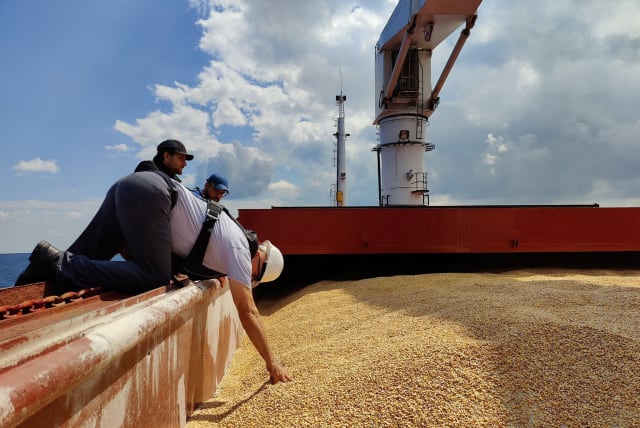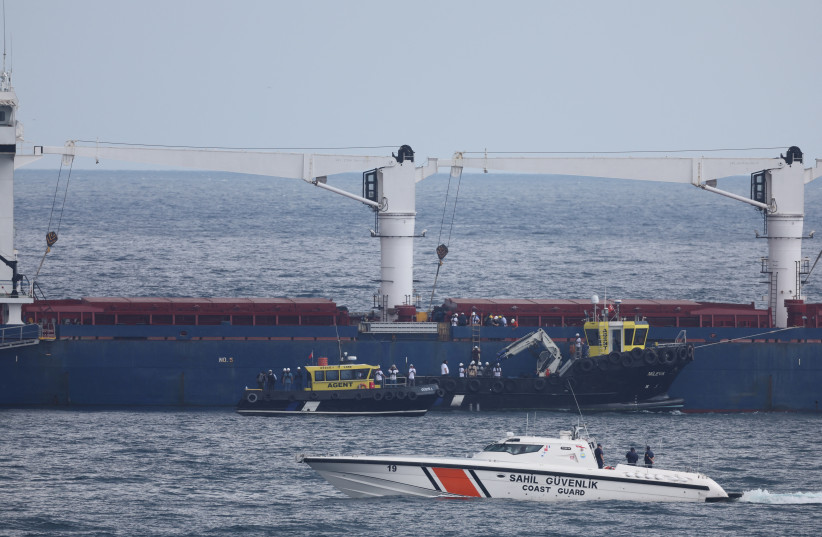Turkish officials say Russia-Ukraine grain deal has proved its worth

The Turkey- and UN-brokered deal allows for the free passage of Ukrainian grain through the Black Sea, which Turkish officials say is key to protecting global food security.
Seven months in, the Black Sea Grain Initiative has successfully prevented a global food security disaster, Turkish officials say.
The deal, brokered by the United Nations and Turkey, allows Ukraine to export grains, oilseeds, fertilizers, and other agricultural products by way of the Black Sea without interference from Russia.
After invading Ukraine in February 2022, Russia enforced a naval blockade, cutting off Ukrainian exports. The embargo caused a steep rise in prices for agricultural products, hitting wheat importers in the Middle East and Africa especially hard.
After the grain deal was signed in July, the UN established a Joint Coordination Center in Istanbul responsible for the safe transport of agricultural products leaving Ukraine, staffed by Russian, Ukrainian, Turkish, and UN personnel. Turkish Rear Admiral Selçuk Akari met with foreign journalists at the Joint Coordination Center this week to discuss the accomplishments of the deal so far.
Akari described the deal as a “resounding” and “unprecedented” success, noting that the creation of a safe corridor to allow for the shipment of grain prevented a major worldwide grain shortage. The deal also improved security conditions worldwide, which had been affected by “the danger of hunger and irregular migration” caused by the embargo.
Turkish and UN officials say the grain agreement is a prime example of successful international collaboration in the agriculture sector. In the face of a potential global food crisis caused by the invasion of Ukraine, the deal has been instrumental in ensuring food security, boosting grain production, and creating trade opportunities among Russia, Ukraine, and Turkey.
Ukraine's grain expors
Ukraine is a major exporter of grain, but the country relies on the Black Sea to get the product to the global market. When Russia invaded Ukraine last February and placed a naval embargo, 20 million tons of grain were blocked from leaving Ukraine’s ports.
Five months later, in July 2022, Russia and Ukraine signed a deal brokered by the UN and Turkey to establish a safe shipping corridor and allow Ukrainian exports to resume.
The deal also allows Russia to export foods and fertilizer through the Black Sea without fear of sanctions. Russia’s agricultural exports are also crucial for the global economy.
The success of the grain deal was initially jeopardized by the lack of standardization in the grain production process among the three countries. Each country had its own set of regulations and standards, which made it difficult for grain produced in one country to be sold in another. The Joint Coordination Center responded to this challenge by developing a set of unified standards that apply to Russia, Ukraine, and Turkey. This standardization ensures the production of higher-quality grain that meets the health and safety standards required for international trade.
“As the Turkish delegation, we continue our duty at the center fully aware that this is a historic and humanitarian mission,” Akari told The Media Line in an interview.
As of Jan. 31, the Joint Coordination Center has overseen the export of almost 20 million tons of Ukrainian grain.
Jerusalem Post Store
`; document.getElementById("linkPremium").innerHTML = cont; var divWithLink = document.getElementById("premium-link"); if (divWithLink !== null && divWithLink !== 'undefined') { divWithLink.style.border = "solid 1px #cb0f3e"; divWithLink.style.textAlign = "center"; divWithLink.style.marginBottom = "15px"; divWithLink.style.marginTop = "15px"; divWithLink.style.width = "100%"; divWithLink.style.backgroundColor = "#122952"; divWithLink.style.color = "#ffffff"; divWithLink.style.lineHeight = "1.5"; } } (function (v, i) { });

